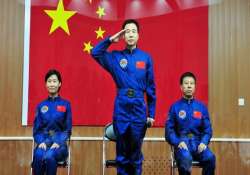China plans to send second woman astronaut into space in 2013
Beijing,Oct 29,2012: China on Sunday said it plans to send its second woman astronaut into space on the country's fifth manned mission in 2013 to fine tune the docking technologies of its space station being

Beijing,Oct 29,2012: China on Sunday said it plans to send its second woman astronaut into space on the country's fifth manned mission in 2013 to fine tune the docking technologies of its space station being built to rival Russia's Mir.
“It is possible that female astronauts will be on board,” Yang Liwei, China's first astronaut and deputy director of the country's manned space programme said.
The exact date of the launch of next year's mission will be decided after a full assessment of previous missions by spacecrafts Shenzhou-8 and Shenzhou-9 which docked with the module of the space station currently orbiting the earth.
Yang said the Shenzhou-10 manned spacecraft will carry three astronauts into space, and that the crew will include veterans and women.
The candidates will be decided early next year. China sent its first woman, an air force pilot Liu Yang to space early this year.
Together with Jing Haipeng and Liu Wang, she went into space aboard Shenzhou-9 on June 16 and conducted a series of scientific tests during the 13-day mission that was hailed as a great success.
Next year's space mission mainly aims to consolidate and improve docking techniques, conduct more scientific experiments and solve problems discovered in the previous missions, Yang said.
“One success doesn't mean success every time. We would like to have more practice and improve the quality,” Yang added.
Yang also said Shenzhou-10 mission will adjust the working schedule and routine of astronauts laying the foundation for building its first space station by 2020.
“Once established, the space station will provide a national-level platform for scientific research in outer space. So the next mission will also focus on technical breakthroughs in environmental control and life support systems,” he said.
After the Shenzhou-10 space mission, China is scheduled to launch the Tiangong-2 space lab module to research supply transport by cargo spaceships, another milestone for China's space programme.
“Space travel won't be a problem for China in the future,” Yang said.
“It is possible that female astronauts will be on board,” Yang Liwei, China's first astronaut and deputy director of the country's manned space programme said.
The exact date of the launch of next year's mission will be decided after a full assessment of previous missions by spacecrafts Shenzhou-8 and Shenzhou-9 which docked with the module of the space station currently orbiting the earth.
Yang said the Shenzhou-10 manned spacecraft will carry three astronauts into space, and that the crew will include veterans and women.
The candidates will be decided early next year. China sent its first woman, an air force pilot Liu Yang to space early this year.
Together with Jing Haipeng and Liu Wang, she went into space aboard Shenzhou-9 on June 16 and conducted a series of scientific tests during the 13-day mission that was hailed as a great success.
Next year's space mission mainly aims to consolidate and improve docking techniques, conduct more scientific experiments and solve problems discovered in the previous missions, Yang said.
“One success doesn't mean success every time. We would like to have more practice and improve the quality,” Yang added.
Yang also said Shenzhou-10 mission will adjust the working schedule and routine of astronauts laying the foundation for building its first space station by 2020.
“Once established, the space station will provide a national-level platform for scientific research in outer space. So the next mission will also focus on technical breakthroughs in environmental control and life support systems,” he said.
After the Shenzhou-10 space mission, China is scheduled to launch the Tiangong-2 space lab module to research supply transport by cargo spaceships, another milestone for China's space programme.
“Space travel won't be a problem for China in the future,” Yang said.